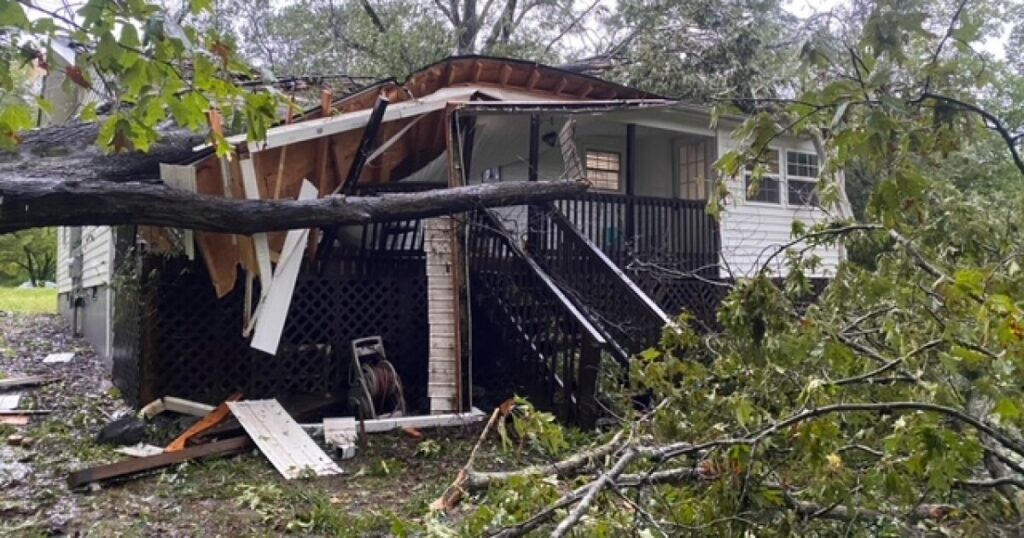North Carolina building code battles get attention in Helene's wake

In the wake of Hurricane Helene, North Carolina Governor Roy Cooper intends to go back to the state’s legislature a third time, after being thwarted twice before in efforts to keep building codes strong.
In 2023, the legislature overrode the governor’s veto of its bill that blocks any new building codes until 2031. Last summer, the legislature overrode another veto, this time taking over the authority to appoint members of the state’s building code council.
“Over the next few months, as the General Assembly works to pass legislation to help with Hurricane Helene recovery, they should consider changing this law,” stated Jordan Monaghan, deputy communications director for the governor, in a written response to questions. “The General Assembly’s legislation that stops the update of building codes makes North Carolina less competitive for federal funds to strengthen the response of communities across the state to natural disasters like Hurricane Helene.”
The governor’s office pointed to an estimate by the state’s Department of Public Safety that these actions by the legislature have cost the state $70 million in FEMA funding, because building codes would not require home construction to be more resilient.
According to the North Carolina Office of the State Fire Marshal, the state-wide building codes are based on I-codes, a series of internationally recognized building codes. Local governments can adopt floodplain management regulations within their jurisdictions, and these are not subject to approval by the state’s building code council. There are 222 such local jurisdictions in North Carolina, a combination of county-wide ones and ones that are for individual municipalities.
State’s ranking dropped
The Insurance Institute for Business & Home Safety (IBHS) ranked North Carolina 6th out of 18 states for the strength of its building codes in 2012, then dropped to 7th in 2015, 2018 and 2021, and to 8th this year.
“Maintaining a regular code update cycle tied to IRC updates is imperative to ensure the latest science and engineering knowledge is incorporated into our building codes,” IBHS’s report stated. “This prevents unnecessary damage to homes and businesses and helps keep pace with rapidly evolving building technologies and materials.”
IBHS’s report on its rankings issued every three years states that North Carolina is only enforcing 2015 level I-code standards, not the most current ones issued in 2021. Florida, bracing for Hurricane Milton, ranked first or second on the IBHS list in each of the five times it was issued.
North Carolina state senator Natasha Marcus is running for state insurance commissioner.
“FEMA will not send money to rebuild in areas that are likely to flood again or have storm damage again, if we’re not going to update our building codes,” said state senator Natasha Marcus, who is running against incumbent insurance commissioner Mike Causey.
More building code downgrades are coming
Marcus pointed to a specific provision approved by the legislature that takes effect on January 1, 2025 that further lowers building requirements, specifically for “sheathing,” which is how many nails must be used and how close together they must be when building a house with plywood.
“It’s supposed to be inspected before you proceed and cover that work up, because if you don’t do it right, the roof’s going to fly off, or the walls are going to fall,” she said. “Starting on January 1, 2025, we’re no longer going to have the sheathing inspections, and I’m very worried about what’s going to happen with that. I don’t know how quickly they’re going to have to admit that was a mistake. Consumers aren’t going to necessarily know that they no longer have that protection.”
Building codes can govern the slope on which homes may be built. In North Carolina, just 20 jurisdictions statewide have these rules, according to a legislative analysis researcher working with North Carolina state representative Pricey Harrison.
Insurance commissioner’s role
While the North Carolina insurance commissioner, as an agency head, does not set building code rules or appoint building code council members, the position deals with the consequences.

North Carolina insurance commissioner Mike Causey.
“What I would rather see, as the insurance commissioner, is the focus be on resiliency and making sure when something’s built it’s not built in a flood plain, or it’s not built in a dangerous location to the extent possible,” said Mike Causey, the commissioner, who noted that flood insurance coverage is typically based on elevation.
“We have one state building code, but you probably have 600 different interpretations of the same building code. What would be good, in my opinion, would be to have a more uniform interpretation,” he added. “There could be somebody at the state level, and that may be the insurance commissioner or building inspector commission, to say this is the correct interpretation. Maybe the building code council should, when there’s language that’s confusing, should say, we’re going to clarify this language by saying, in this case, this is what needs to be done.”
Causey’s opponent, Marcus, acknowledges that the commissioner does not have direct authority over building codes, but said, “Any time there is an issue that impacts life and safety and or insurance in our state, the Commissioner of Insurance has the ability, and I think the duty, to weigh in, if sometimes only by the bully pulpit or talking to and finding partners who want to work on that. It would definitely be part of my focus as Commissioner of Insurance to address our out of date building codes, because it directly affects insurance and life and safety.”
Marcus said she wants to hear from local building inspectors in areas affected by Helene about what caused buildings to fail, and what they think should be done in rebuilding. “I hope there will be a new push to update the building codes about building on steep slopes,” she said.
The North Carolina legislature was scheduled to hold a special session October 9 for a disaster relief bill.







